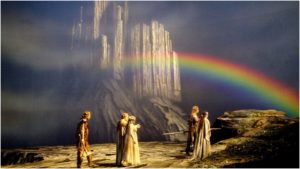
Opera Profile: Wagner’s ‘Das Rheingold’
By Logan MartellDas Rheingold is the first of Richard Wagner’s famous ‘Ring’ cycle and had its world premiere on Sept. 22, 1869. The libretto for the work was interestingly composed after the other three works in the cycle, though it was the first to be composed and performance of the tetralogy. “Das Rheingold” reveals the origin of the ring forged from the titular treasure, as well as the characters and circumstances that end up shaping the events for the other three works.
Short Plot Summary
The opera opens at the bottom of the Rhine river. Alberich, a member of the subterranean race of the Nibelung, fruitlessly pursues the Rhine maidens in romance before stumbling upon their treasure, the Rheingold. The maidens tell Alberich that the gold, if forged into a ring, would bring its wielder power enough to rule the world; though the gold is protected by a spell that wards off any man who desires love, Alberich’s cursing of the Rhine maidens allows him to claim the gold for himself, much to their horror.
On top of a mountain, Wotan and his wife Fricka awake to see a glorious castle before them. Their home now completed, they are visited by Fafner and Fasolt, giants who had entered into an oath with Wotan to construct the castle, binding themselves to each other by the runes on Wotan’s spear, the source of his power. Wotan at first refuses to give them payment in the form of Fricka’s sister Freia, having sent Loge to search for a treasure of equal worth. Though Loge returns empty-handed, he tells of the Rheingold taken by Alberich, which Fafner and Fasolt accept as a worthy payment before they depart with Freia as collateral.
Wotan and Loge descend into Nibelheim, where Alberich has become a tyrant; he rules over his people with the power of the ring and the newly-forged Tarnhelm, which allows its wearer to change shape and become invisible. While Wotan and Loge are able to trick Alberich into forfeiting his treasure, ring, and helmet, he curses the objects to bring unending sorrow to those who possess them, and unending desire to those who do not.
Returning to his castle with worthy payment, Wotan piles the treasure high enough in front of Freia so that the giants will no longer see and desire her. At first seeming successful, the giants protest the ring must be added to the pile to close the hole through which they see Freia’s eye. Wotan initially refuses to part with the ring, but is persuaded to relinquish it by the appearance and warning of the primeval goddess Erda. When Fasolt takes the ring, he is quickly beaten to death by his envious brother Fafner, who departs after his shocking display of the power of the ring’s curse. Wotan and the gods are now free to enter their new home, which is given the name ‘Valhalla.’ Its meaning, Wotan riddles, will be revealed in time.
Famous Musical Numbers:
The opera’s opening is easily its most famous passage, Wagner reportedly claiming that he had a dream of hearing its entire genesis from a low E flat and then slowly felt the entire chord building on itself.
The entire opera is built on Wagner’s famed leitmotif in his most literal fashion, with the composer creating many of the major themes that would permeate his famous tetrology.
Structurally, one of the fascinating moments of the two-plus hour spectacle is hearing the Gods descend to Niebelheim and then travel back up from it. In both instances, the music moves in one direction before Wagner inverts it on the way back up.
The grand finale, which showcases the Gods walking into Valhalla is among the most popular passages in the famed work.
Watch and Listen
Patrice Chéreau’s famous production, conducted by Pierre Boulez is perhaps the most essential in the opera’s audiovisual recorded legacy.
Categories
Opera Wiki

